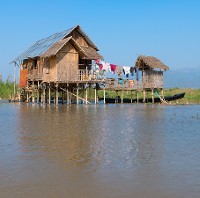Understanding disaster resilience
Specifically, the RISK Program seeks to:
- Understand disaster resilience based on systems thinking considering the multi-scale and multi-variable dynamics of disaster risk and wellbeing;
- Develop qualitative and quantitative modeling tools for the assessment of resilience and resilience-based interventions;
- Explore and inform the implementation of robust policy interventions across multiple levels that have the potential to bolster resilience of households, communities, governments and the private sector.
RISK’s research on resilience is both conceptual and applied, working towards informing resilience-based policy. Through transboundary action research involving communities, governments, non-governmental organizations, and the private sector, the group develops theoretical and methodological frameworks for improved decision making under risk and uncertainty. It combines traditional risk assessment with a novel approach of participatory disaster resilience appraisal.
Background
Resilience thinking, a concept coined and developed at IIASA by Buzz Holling, is permeating many scientific disciplines, policy and practice.
Disaster risk analysis and management, which is confronted by numerous challenges, has been particularly quick to pick up on resilience concepts and definitions. The challenges in disaster risk analysis and management stem from an approach which is:
a) dominated by response and recovery to the neglect of risk reduction and preparedness;
b) too hazard-focused, ignoring the complex interactions between disaster events, disaster risk management initiatives, human agency and ecological systems.
Left unchecked, these challenges are prone to being amplified by trends in population growth, urbanization, and climate change, all of which are predicted to result in increasing frequency and severity of disasters in the medium term.
While resilience thinking provides an entry point for a holistic and systemic understanding of both disaster risk management and development, moving from concepts to operationalization to implementation is a key challenge.
Associated projects
The research feeds into a number of major projects: ENHANCE, Flood Resilience, and Cambodia (SDMSC).
ENHANCE - Improving the resilience of society to catastrophic natural hazards through new risk-management partnerships
Improving the resilience of society to catastrophic natural hazards through new risk-management partnerships More
Cambodia CATSIM: Understanding disaster risk and resilience in Cambodia
IIASA collaborates with the Asian Disaster Preparedness Center (ADPC) on a project “Strengthening the Disaster Management Systems in Cambodia through Risk Assessment, Early Warning Systems and Developing Building Codes” supported by the World Bank. More
Flood Resilience
IIASA is a core member of the Flood Resilience Alliance, an innovative partnership between research, development and humanitarian NGOs and the private sector that works together for making at step change with regard to policy, finance and practice of managing floods and other climate-related hazards towards increased community resilience. More


NEWS
"Climate Modernity" - The 24H Challenge: How do we want to live and act in the future in Styria ?
Health fears can increase pandemic isolation habits in older Europeans
How circular waste management systems can benefit the environment
Launch of the Northern African Applied Systems Analysis Centre
How we measure the effects of methane matters for climate policy





